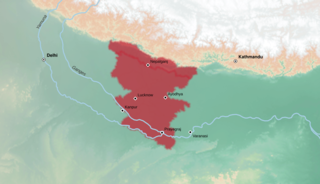Our website is made possible by displaying online advertisements to our visitors.
Please consider supporting us by disabling your ad blocker.
Awadhi language
| Awadhi | |
|---|---|
| Avadhī | |
| अवधी · 𑂃𑂫𑂡𑂲 | |
 The word "Awadhi" written in Devanagari script | |
| Pronunciation | [əʋ.d̪ʱi] |
| Native to | India and Nepal |
| Region | Awadh |
| Ethnicity | Awadhis |
Native speakers | 38.5 million in India (2011)[1][2][3] |
Early forms | |
| Dialects |
|
| |
| Official status | |
Official language in | |
| Language codes | |
| ISO 639-2 | awa |
| ISO 639-3 | awa |
| Glottolog | awad1243 |
| Linguasphere | 59-AAF-ra |
 | |
Awadhi,[a] also known as Audhi,[b] is an Indo-Aryan language spoken in the Awadh region of Uttar Pradesh in northern India and in Terai region of western Nepal.[5][6][7] The name Awadh is connected to Ayodhya, the ancient city, which is regarded as the homeland of the Hindu deity Rama, the earthly avatar of Vishnu. Awadhi is also widely spoken by the diaspora of Indians descended from those who left as indentured laborers during the colonial era. Along with Braj, it was used widely as a literary vehicle before gradually merging and contributing to the development of standardized Hindi ( Khadi Boli ) in the 19th century. Though distinct from standard Hindi, it continues to be spoken today in its unique form in many districts of central Uttar Pradesh.[8]
It is regarded by the Indian government to be a dialect of Hindi, and the area where Awadhi is spoken to be a part of the Hindi-language area owing to their cultural proximity, meanwhile Standard Hindi also serves as the lingua franca[9] of the region. As a result, Hindi, rather than Awadhi, is used for school instruction as well as administrative and official purposes; and its literature falls within the scope of Hindi literature.[10] Some of the most culturally significant works in Indian literature like the Ramcharitmanas and Hanuman Chalisa have been written in Awadhi.
Alternative names of Awadhi include Baiswāri (after the subregion of Baiswara),[11] as well as the sometimes ambiguous Pūrbī, literally meaning "eastern", and Kōsalī (named after the ancient Kosala Kingdom).[6]
- ^ "The Slow Death of Awadhi and Bhojpuri".
- ^ "Omniglot — Awadhi (अवधी)".
- ^ "'Awadhi language is grouped as mother tongue under Hindi' says Minister of State for Home Affairs".
- ^ Oldenburg, Veena Talwar. The Making of Colonial Lucknow, 1856–1877. Princeton University Press. p. 5.
- ^ Meaning, Nepali (12 August 2023). "Origin, Structure, Development, and Situation of Awadhi Language in Nepal - Nepali Meaning". nepalimeaning.com. Retrieved 4 February 2024.
- ^ a b Saxena (1971:1)
- ^ Grierson (1904:1)
- ^ Saxena (1971:6)
- ^ Kawoosa, Vijdan Mohammad (22 November 2018). "How languages intersect in India". Hindustan Times. Archived from the original on 15 October 2022.
- ^ Masica (1993:9)- A vast central portion of the subcontinent, consisting of the Indian states of Uttar Pradesh, Bihar, Madhya Pradesh, Rajasthan, Haryana, and Himachal Pradesh, plus the Union Territory of Delhi, is known as the "HINDI area", because the official and general written language, that is to say, that of administration, press, school instruction, and modern literature, is Hindi, sometimes called MODERN STANDARD HINDI, and the whole area is heir to the "Hindi literary tradition" – Hindi being used here in a different and wider sense, to refer to pre-modern literature in Braj and Awadhi, and often to those languages proper to Rajasthan and Bihar as well
- ^ Grierson (1904:10)
Cite error: There are <ref group=lower-alpha> tags or {{efn}} templates on this page, but the references will not show without a {{reflist|group=lower-alpha}} template or {{notelist}} template (see the help page).
Previous Page Next Page


